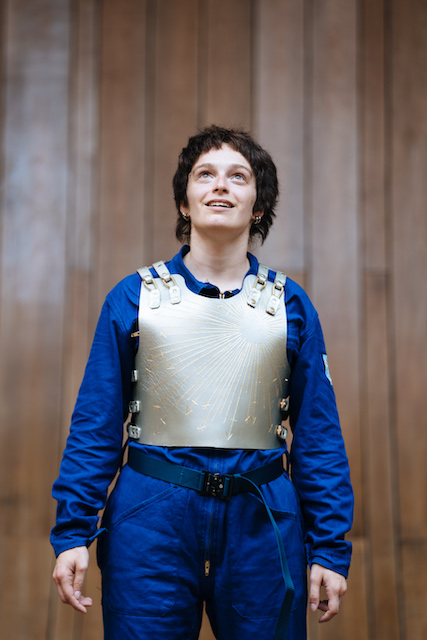This raw, joyous, irreverent take on Joan of Arc made headlines before opening night for its depiction of the fifteenth-century warrior saint as non-binary. Yet what shines out in Charlie Josephine’s fresh, deliberately pared-down script is that all of us struggle to fit precisely into the categories that language assigns to us. There’s no sense of the erasure of the female struggle in this re-examination of Joan’s legacy – the play features many strong women, not least the king’s mother-in-law, Debbie Korley’s stylishly fearsome Yolande of Aragon. The fact is that Joan of Arc was by anyone’s standards, unique. Other women in their century, not least Isabelle of Castile, rode into battle and didn't question their femininity.
Like any good play – and to be clear this is a good rather than a great play – it’s far more than the sum of any arguments that underpin it. That’s in no small part due to the ebullient playful stage presence of Isobel Thom, a recent graduate from the Royal Welsh College of Music & Drama and a clear star in the making (pictured below right). In their opening monologue they declare, “I’m fucking frightened. I’m 17! But I have a job to do that’s bigger than me…I’m burning, I am burning, I am burning with possibility! I have a vision of Infinite Grace! Of Limitless Expansion! Of Delicious Fluid Freedom, of Liberation, and Joy! I pray we all have the courage to be open to the Infinite, because none of us fit these man-made boxes, none of us fit them at all.”
 The sense is of someone bursting with life rather than attempting to paralyse with polemic. It’s in keeping with this effusive style that Ilinca Radulian’s dynamic production takes place on a sweeping curved set that looks like a skateboarder’s dream. There’s no actual skateboarding – did they decide a skateboarding, non-binary Joan would be a twist too far? Instead the characters treat it as a slide, swooshing down from the musician’s gallery to join the mashed-up medieval fray.
The sense is of someone bursting with life rather than attempting to paralyse with polemic. It’s in keeping with this effusive style that Ilinca Radulian’s dynamic production takes place on a sweeping curved set that looks like a skateboarder’s dream. There’s no actual skateboarding – did they decide a skateboarding, non-binary Joan would be a twist too far? Instead the characters treat it as a slide, swooshing down from the musician’s gallery to join the mashed-up medieval fray.
It’s inherent to the playful teasing tone that Joan brings their vision into a court where the vast majority of individuals are testing the boundaries of gender. Take Jolyon Coy’s charismatic foppish Dauphin, Charles, who is clearly far more besotted with his courtier Thomas than with his wife. Or Yolande of Aragon who is described, in a historically uncontroversial phrase, as having a “man’s heart in a woman’s body”. Or his pregnant wife Marie (Janet Etuk), who – it’s clear – is more efficient at running state matters than Charles. There have always been different interpretations of gender, the play shows; what’s critical in both this and other histories is to identify at what point these interpretations become feared and open to persecution.
Money and power are two of the factors that come under Josephine’s microscope and to be frank this would have borne more exploration. Joan needs to escape the prison that their peasant status imposes on them as much as being a woman. One of the most interesting relationships in the play is the one they have with Thomas, played brilliantly – and with uncharacteristic understatement – by Adam Gillen. “I, I am not married…I…don’t come from money,” he says at one point. “I was chosen by Charles to join this court, and yet still I am not respected by these men.” In a particularly compelling moment he talks to Joan about how he also feels like an outsider because he is not religious; for all their uniqueness in this they are more socially conformist than him, though of course it will not save them.
Josephine admits that they have found the issue of Joan’s religion much more difficult than the gender discussions for which the play has made headlines. Their decision to handle this by emphasising the ecstatic aspect of Joan’s religion rather than the theology makes perfect sense - they were, after all, illiterate. Yet after a while it makes the script teeter towards being over simplistic and if you’re here to get a deeper understanding of the political and religious workings of medieval France then you’ll feel short-changed. On a more basic dramatic level it makes Joan’s ordering around of Charles’ chief military commander because of their divine vision feel unjustified and unsympathetic.
But to be frank most people won’t be coming to this for the medieval theology. And against the hostile backdrop of the trans debate, this defiantly humane and buoyant tribute to the complexity of the human condition is a good way to start looking at different ways of shaping the narrative. Special mention should be made of Jennifer Jackson’s spirited energetic choreography, which brings a punkish swagger to the danced battle scenes. Maybe it’s a provocation too far to say this is a Joan of Arc with balls, but it certainly revitalises their story for a time that’s far too defined by intransigence and weaponised hate.















Add comment